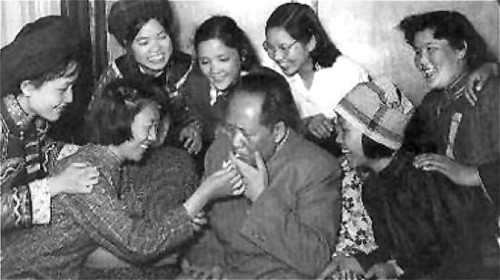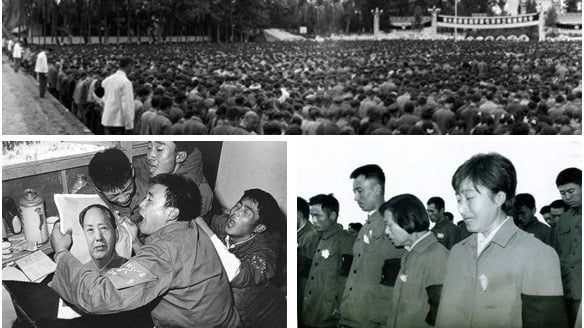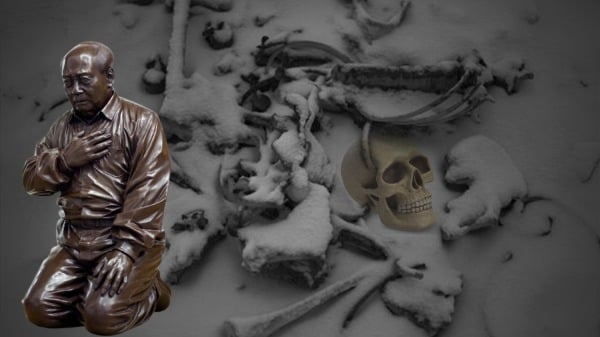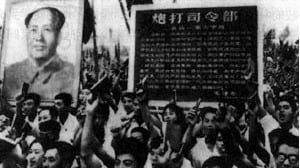
[ad_1]
Many people thinkMao eraAre equal, is that really the case? (Picture source: Composite picture, self-made picture taken by Jin Tao)
Everyone is familiar with the first sentence in the opening chapter of “The Three Character Classic”: “In the beginning, human nature is inherently good.” In today’s world where materialism prevails and everything is focused on “money”, kindness is so precious. But true kindness is a kind of wisdom, a rational judgment made after a complete understanding of the basic facts of a matter and a detailed examination of the development trend of the matter.
Faced with today’s social chaos, many people feel thatMao ZedongThe people of that era were simple and honest, and they worshiped Mao Zedong. According to the traditional Chinese custom of “laying his body to rest”, Mao has not been buried yet and is placed in a crystal coffin for everyone to watch. According to folk wisdom, this is not a good thing.
Many people think that there was equality in Mao’s era. Is this really the case? In fact, officials and ordinary people are divided into seventeen levels. On the surface, there is not much difference in salary, but salary is not the main income, because buying rice and oil depends on votes and planned supply. At that time, privilege was very serious. Behind the superficial wage gap was the difference in treatment. The Communist Party places special emphasis on treatment. The bigger the leader, the better the treatment and the more privileges he has. Children of high officials can go to university without taking the college entrance examination. Mao Zedong himself enjoyed supreme privileges and beautiful women, even though many people in China starved to death.
Mao’s diet and privileges
Everyone knows that Mao Zedong liked braised pork the most, but during the “Three Years of Difficulty Period” (Editor’s Note: Actually the three years of famine from 1959 to 1961), he announced that he would share the joys and sorrows with the people of the country and would not eat meat. The fact is that his health doctor said that pork has high cholesterol content and recommended that he eat beef and mutton instead. In addition, he also eats fish, which is also Mao’s favorite.
During the three-year famine, the staff and chefs around Mao carefully formulated a Western menu for him, including: fish, shrimp, chicken, duck, beef and mutton, etc. Fish and shrimp dishes include steamed fish pudding, Moscow red grilled fish, soft fried prawns, etc. Chicken includes soft-fried chicken steak, braised chicken with onions, coconut chicken, butter chicken, etc. Beef and mutton include roasted lamb legs, fried lamb liver, steak, etc.
The staff around Mao Zedong could see what Mao was eating, and what they and their families were eating. Mao told them that his good things were “the treatment given to me by the people” and others “had no right” to enjoy them. Mao’s housekeeper once secretly took some of Mao’s food home. After being discovered, he was sent to Beidahuang for labor reform.

It is reported that as many as a thousand women were manipulated by Mao Zedong. (Picture source: Internet picture)
Mao’s private life was promiscuous
Li Zhisui (suí), who served as Mao Zedong’s doctor for 22 years, wrote a book called “Memoirs of Mao Zedong’s Personal Physician”. The book revealed that Mao Zedong’s private life was extremely licentious and that he maintained sexual relations with multiple women. Yang Kaihui was just A public one. He hooked up with Jiang Qing while living with his second wife He Zizhen, and later abandoned He to marry Jiang Qing. After moving into Zhongnanhai, he often hired young and beautiful women to stay with him overnight. His lover in his later years, Zhang Yufeng, even became a member of the Politburo. It is said that as many as a thousand women were manipulated by Mao Zedong.
Mao’s clothes
The media publicized that Mao’s clothes had dozens of patches to highlight the great leader’s frugality. In fact, Mao Zedong didn’t pay attention to clothes because he loved comfort. He hasn’t changed his shoes for years because old shoes are more comfortable. Whenever he changed into new shoes, he would ask the guards to loosen them for him before wearing them again. His bath towels and towels and quilts were patched again and again, but they were not ordinary patches. They were taken to Shanghai to have the most skilled craftsmen darn them carefully, and the cost was many times higher than buying new ones. This is not a matter of “hardship and austerity,” but a hedonistic quirk common to many of the world’s richest and most powerful people.
Mao likes villas
Mao Zedong loved villas. During the Great Famine, villas were built for Mao in various places. There were at least fifty villas across the country, including five in Beijing alone. They are often located in beautiful scenic areas. Once selected, the entire mountain or the entire lakeshore or coast will be enclosed for Mao’s enjoyment.
At that time, tens of millions of people across the country were starving to death, but in order to please Mao Zedong, local officials used a large amount of national resources to build a secret “palace” for Mao in Dishuidong, Shaoshan. Mao also accepted the generous gifts from local officials calmly.
god-making movement
At that time, people praised Mao Zedong as the red sun and forced people to learn to sing “The East Is Red”. During the Cultural Revolution, Mao Zedong’s “god-making” movement reached its peak, implanting Mao’s thoughts into the minds of hundreds of millions of people. People across the country practiced the same religious worship ritual of “asking for instructions early and reporting at night” (asking for instructions early means asking for instructions every morning after getting up every morning). Mao Zedong first bowed three times, then wished the leader long life, and then talked about what he had done today. The evening report refers to repeating the morning bows and blessings, and then reporting what was done today, what was done well, and what was not done well. , what to do in the future), I wish Chairman Mao a long life many times a day.
At that time, almost everyone wrote self-criticism and ideological reports, and Mao’s words were all quotations, such as “If you understand, you must implement it, if you don’t understand, you must implement it, and you will deepen your understanding during execution”, “Fighting private words in a flash” and so on. During the Cultural Revolution, only one “god” was allowed to be worshiped and only one “scripture” was recited – Chairman Mao’s Quotations. You cannot buy food in the cafeteria without memorizing quotations and respectfully wishing Mao Zedong. When shopping, riding in a car, or making a phone call, you have to recite an irrelevant quote. When people do these things, they are either enthusiastic and excited, or indifferent. Over time, praising Mao has become the way of life for Chinese people.

The scene when Mao Zedong died. (Picture source: Internet picture)
Mao made the Chinese people stand up?
During the Mao era, the people could not rely on their own efforts to turn things over. Why is it so difficult for Chinese people to settle in big cities such as Beijing, Shanghai, and Shenzhen today? Because Mao Zedong believed that rural areas should serve the cities and farmers could not move into the cities casually, the household registration system turned many people into “second-class citizens.” People with rural household registration cannot go to the national grain store to buy grain, and their children cannot go to the city to go to school. The children of farmers can only become farmers again. Hundreds of millions of migrant workers work hard for China’s economy, but they always live at the bottom of society.
The CCP’s history is written with blood and lies, and the story behind it is not only tragic but also rarely known. Some people think that Mao Zedong made the Chinese people stand up, but look at the large number of people who fled to Hong Kong in the 1960s because they did not have enough to eat. Nationwide famine and large-scale abnormal deaths occurred one after another, and even the tragedy of cannibalism occurred. In 1958, Mao Zedong suddenly had the idea of ”catching up with the United Kingdom and surpassing the United States” (catching up with the United Kingdom and surpassing the United States) and “running into communism”, so he launched an extreme left-wing “Great Leap Forward Movement” from top to bottom.

Local officials put Mao Zedong’s orders first, and human nature was replaced by party spirit. At that time, in many villages, ordinary people died one by one. (Picture source: Composite picture, self-made picture taken by Jin Tao)
The Great Leap Forward led to the Great Famine
During the Great Leap Forward, high targets, blind command, false reporting, exaggeration, and “communist style” prevailed. Various places proposed unrealistic goals for the Industrial Great Leap Forward and the Great Agricultural Great Leap Forward, and one-sidedly pursued the high speed of industrial and agricultural production and construction. , significantly improve and modify plan indicators. In agriculture, we put forward “taking grain as the key link” and constantly promoted “high-yielding satellites” and “how bold the people are, how productive the land is”, and the grain output per mu has increased step by step. In industry, in order to achieve the annual steel production target of 10.7 million tons, tens of millions of people across the country launched the “National Steelmaking Movement”, and “taking steel as the key link” has driven other industries (transportation, post and telecommunications, education, The “Great Leap Forward” of culture, health, etc.
In order to cater to Mao Zedong, officials at all levels competed with each other to report high yields. In the end, the yields per mu were reported to be hundreds of thousands of kilograms. In the end, it was the people who suffered. After their rations were plundered, they began to eat grass. They ate mice and lice at home. When they wanted to escape, the officers and soldiers blocked their way out. People were starving to death along the roads and railways. . Don’t the local officials know the situation? Of course I know, but dead people are not important. What is more important than human nature is party spirit, which is Mao Zedong’s order. At that time, in many villages, people died one by one.
During the famine, cannibalism occurred. In one farm family, only the father and two children, a boy and a girl, were left. One day, the father kicked his daughter out of the house. When the girl came home, her brother was missing. There was a layer of white and oily things floating in the pot, and a bone was thrown next to the stove. A few days later, the father added water to the pot and called his daughter over. The girl was so frightened that she hid outside the door and cried loudly, pleading: “Dad, don’t eat me. I will make grass and light the fire for you. If you eat me, no one will do the work for you.” ‘(from writer Sha Qing’s reportage “Vaguely Dadiwan”)
The folk songs of the Great Leap Forward are a portrayal of the arrogance and stupidity under Mao’s leadership at that time: “Let the mountains bow their heads, let the rivers give way”; “There is no Jade Emperor in the sky, and there is no Dragon King on the earth. I am the Jade Emperor, I am the Dragon King. Order the three mountains and five ridges to clear the way, Here I come!” Mao Zedong always believed that man can conquer nature, which triggered the Great Leap Forward from the end of 1957 to the beginning of 1960. Tens of millions of lives paid for Mao Zedong’s atrocities, and it was estimated that 35 to 45 million people died of starvation at that time.
In July 1959, Peng Dehuai wrote to Mao pointing out the “exaggerated atmosphere” and other problems in the “Great Leap Forward”. At the Lushan Conference, Mao Zedong launched a surprise attack to kill Peng Dehuai. Who among the participants didn’t know that Peng Dehuai’s opinion was correct? Who doesn’t know that Mao Zedong’s Great Leap Forward was absurd and arbitrary? But supporting or not supporting Mao Zedong’s line is the line between life and death. In the end, Peng Dehuai himself had to sign the resolution to overthrow Peng Dehuai against his will.
Peng Dehuai, who petitioned for the people, was purged, and a large number of cadres who dared to tell the truth were removed from their posts, imprisoned, and censored. By the time of the Great Famine, no one dared to tell the truth. Almost all of them covered up the fact that people starved to death in order to save their own status. the truth.

After the beginning of the Cultural Revolution, there was an upsurge of suicides in China. (Picture source: Internet picture)
Cultural Revolution (1966~1976)
Mao Zedong’s philosophy of struggle – “There is endless joy in fighting against heaven, endless joy in fighting against earth, and endless joy in fighting against people”, which ultimately dragged China into an unprecedented catastrophe – the Cultural Revolution. Mao Zedong said that he was “a monk holding an umbrella, lawless”.
Li Lisan, a former leader of the Communist Party of China, was cornered during the Cultural Revolution. At the age of 68, he was criticized an average of more than 7 times a month. His wife, Li Sha, was treated as a “Soviet revisionist” spy and has been thrown into prison long ago, with no news at all. In despair, he swallowed a large amount of sleeping pills and committed suicide. Li Lisan wrote a letter to Mao Zedong before he died, which truly reflects the “party spirit” of a Communist who dare not give up even when he is about to die:
Chairman: I am now embarking on the road of committing suicide and rebelling against the Party. I have no way to defend my crime. The only thing is that my whole family and I have never committed any crimes involving foreign affairs. Only on this point, I request the central government to investigate and review effectively and make a realistic conclusion…
This passage by Li Lisan reflects the fate of the elite during the Cultural Revolution. After the beginning of the Cultural Revolution, there was an upsurge in suicides in China. Many famous intellectuals such as Lao She, Fu Lei, Jian Bozan, Wu Han, Chu Anping, etc. all met their end during the Cultural Revolution.
At that time, Lin Biao said about Mao Zedong, “A small group today, a small group tomorrow, and when added up, it will be a large area.” This means that Mao Zedong persecutes this small group of people today, and that small group of people tomorrow, and in the end most people will be persecuted by him. . When Mao Zedong summed up the Cultural Revolution, he said: “When the world is in chaos, it will reach great order, and it will happen again in seven or eight years.” To put it bluntly, there will be another movement in seven or eight years, and another batch of people will be killed in seven or eight years.
The Cultural Revolution not only affected one generation, but the Cultural Revolution was a culture of hatred, a culture of violence, and a derogation of love, which affected several generations. This is really the biggest pain.
Common traits of dictatorial leaders in communist countries
Mao Zedong himself made it very clear: “The gunshot of the October Revolution brought us Marxism-Leninism.” In fact, the CCP was the Communist branch of the Third International. It took Soviet money and guns, and used Soviet advisors to establish such a communist regime. The leaders of the Communist Party are inconsistent in their words and deeds, and their words and deeds are inconsistent, starting from the founder Marx.
The “communist moral character” and “serving the people” that Communist Party leaders often teach the public are almost all lies. Marx gave birth to a child out of wedlock, Lenin contracted syphilis from prostitutes, Stalin was accused of occupying singers, Mao Zedong indulged in sensuality, Jiang Zemin committed adultery, Romanian party leader Ceausescu and his family were raised to heaven, former Cuban leader Castro deposited hundreds of millions in overseas banks, North Korea ate The descendants of Kim Il Sung, the demon king, spend tens of thousands of dollars every day…
Decades of brainwashing and suppression by the CCP have forced its way of thinking and standards of good and evil into the depths of Chinese people’s lives, so much so that we all accept and agree with its fallacies to a certain extent, and have become its part of. Eliminate the lies it instills from life, see its true nature, and revive our humanity and conscience.
Editor-in-Chief: Fu Longshan Source: View China Contributions
Short URL:
All rights reserved. Reprinting in any form requires permission from this site.It is strictly prohibited to create mirror websites.
[Honorary Members Wanted]Streams can merge into the sea, and small kindnesses can achieve great love. We sincerely recruit 10,000 honorary members from Chinese people all over the world: each honorary member only needs to pay a subscription fee per year and become an honorary member of the “Look at China” website, which can help us break through censorship and blockade and provide services to at least 10,000 mainland Chinese compatriots. Provide independent and true key information to warn them in times of crisis and save them from great plagues and other social crises.






